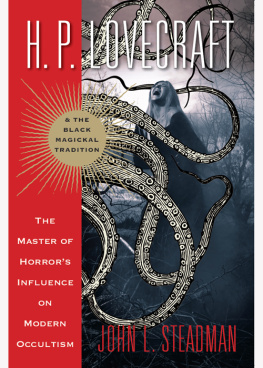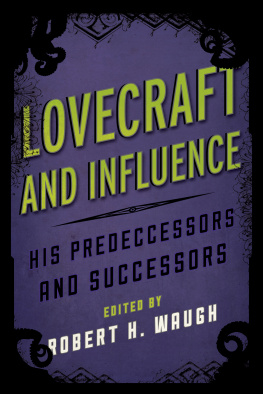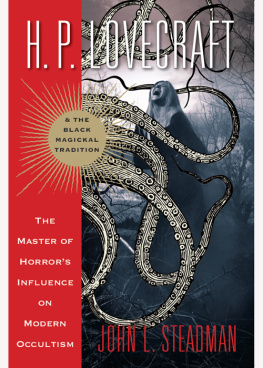Howard Lovecraft - Cool Air
Here you can read online Howard Lovecraft - Cool Air full text of the book (entire story) in english for free. Download pdf and epub, get meaning, cover and reviews about this ebook. genre: Science fiction. Description of the work, (preface) as well as reviews are available. Best literature library LitArk.com created for fans of good reading and offers a wide selection of genres:
Romance novel
Science fiction
Adventure
Detective
Science
History
Home and family
Prose
Art
Politics
Computer
Non-fiction
Religion
Business
Children
Humor
Choose a favorite category and find really read worthwhile books. Enjoy immersion in the world of imagination, feel the emotions of the characters or learn something new for yourself, make an fascinating discovery.

- Book:Cool Air
- Author:
- Genre:
- Rating:4 / 5
- Favourites:Add to favourites
- Your mark:
- 80
- 1
- 2
- 3
- 4
- 5
Cool Air: summary, description and annotation
We offer to read an annotation, description, summary or preface (depends on what the author of the book "Cool Air" wrote himself). If you haven't found the necessary information about the book — write in the comments, we will try to find it.
Cool Air — read online for free the complete book (whole text) full work
Below is the text of the book, divided by pages. System saving the place of the last page read, allows you to conveniently read the book "Cool Air" online for free, without having to search again every time where you left off. Put a bookmark, and you can go to the page where you finished reading at any time.
Font size:
Interval:
Bookmark:
Cool Air
by H.P.Lovecraft
You ask me to explain why I am afraid of a draught of cool air; why I shiver more than others upon entering a cold room, and seem nauseated and repelled when the chill of evening creeps through the heat of a mild autumn day. There are those who say I respond to cold as others do to a bad odour, and I am the last to deny the impression. What I will do is to relate the most horrible circumstance I ever encountered, and leave it to you to judge whether or not this forms a suitable explanation of my peculiarity.
It is a mistake to fancy that horror is associated inextricably with darkness, silence, and solitude. I found it in the glare of mid-afternoon, in the clangour of a metropolis, and in the teeming midst of a shabby and commonplace rooming-house with a prosaic landlady and two stalwart men by my side. In the spring of 1923 I had secured some dreary and unprofitable magazine work in the city of New York ; and being unable to pay any substantial rent, began drifting from one cheap boarding establishment to another in search of a room which might combine the qualities of decent cleanliness, endurable furnishings, and very reasonable price. It soon developed that I had only a choice between different evils, but after a time I came upon a house in West Fourteenth Street which disgusted me much less than the others I had sampled.
The place was a four-story mansion of brownstone, dating apparently from the late forties, and fitted with woodwork and marble whose stained and sullied splendour argued a descent from high levels of tasteful opulence. In the rooms, large and lofty, and decorated with impossible paper and ridiculously ornate stucco cornices, there lingered a depressing mustiness and hint of obscure cookery; but the floors were clean, the linen tolerably regular, and the hot water not too often cold or turned off, so that I came to regard it as at least a bearable place to hibernate till one might really live again. The landlady, a slatternly, almost bearded Spanish woman named Herrero, did not annoy me with gossip or with criticisms of the late-burning electric light in my third-floor front hall room; and my fellow-lodgers were as quiet and uncommunicative as one might desire, being mostly Spaniards a little above the coarsest and crudest grade. Only the din of street cars in the thoroughfare below proved a serious annoyance.
I had been there about three weeks when the first odd incident occurred. One evening at about eight I heard a spattering on the floor and became suddenly aware that I had been smelling the pungent odour of ammonia for some time. Looking about, I saw that the ceiling was wet and dripping; the soaking apparently proceeding from a corner on the side toward the street. Anxious to stop the matter at its source, I hastened to the basement to tell the landlady; and was assured by her that the trouble would quickly be set right.
"Doctair Muoz," she cried as she rushed upstairs ahead of me, "he have speel hees chemicals. He ees too seeck for doctair heemselfseecker and seecker all the timebut he weel not have no othair for help. He ees vairy queer in hees seecknessall day he take funnee-smelling baths, and he cannot get excite or warm. All hees own housework he dohees leetle room are full of bottles and machines, and he do not work as doctair. But he was great oncemy fathair in Barcelona have hear of heemand only joost now he feex a arm of the plumber that get hurt of sudden. He nevair go out, only on roof, and my boy Esteban he breeng heem hees food and laundry and mediceens and chemicals. My Gawd, the sal-ammoniac that man use for keep heem cool!"
Mrs. Herrero disappeared up the staircase to the fourth floor, and I returned to my room. The ammonia ceased to drip, and as I cleaned up what had spilled and opened the window for air, I heard the landlady's heavy footsteps above me. Dr. Muoz I had never heard, save for certain sounds as of some gasoline-driven mechanism; since his step was soft and gentle. I wondered for a moment what the strange affliction of this man might be, and whether his obstinate refusal of outside aid were not the result of a rather baseless eccentricity. There is, I reflected tritely, an infinite deal of pathos in the state of an eminent person who has come down in the world.
I might never have known Dr. Muoz had it not been for the heart attack that suddenly seized me one forenoon as I sat writing in my room. Physicians had told me of the danger of those spells, and I knew there was no time to be lost; so remembering what the landlady had said about the invalid's help of the injured workman, I dragged myself upstairs and knocked feebly at the door above mine. My knock was answered in good English by a curious voice some distance to the right, asking my name and business; and these things being stated, there came an opening of the door next to the one I had sought.
A rush of cool air greeted me; and though the day was one of the hottest of late June, I shivered as I crossed the threshold into a large apartment whose rich and tasteful decoration surprised me in this nest of squalor and seediness. A folding couch now filled its diurnal role of sofa, and the mahogany furniture, sumptuous hangings, old paintings, and mellow bookshelves all bespoke a gentleman's study rather than a boarding-house bedroom. I now saw that the hall room above mine the "leetle room" of bottles and machines which Mrs. Herrero had mentioned was merely the laboratory of the doctor; and that his main living quarters lay in the spacious adjoining room whose convenient alcoves and large contiguous bathroom permitted him to hide all dressers and obtrusively utilitarian devices. Dr. Muoz, most certainly, was a man of birth, cultivation, and discrimination.
The figure before me was short but exquisitely proportioned, and clad in somewhat formal dress of perfect cut and fit. A high-bred face of masterful though not arrogant expression was adorned by a short iron-grey full beard, and an old-fashioned pince-nez shielded the full, dark eyes and surmounted an aquiline nose which gave a Moorish touch to a physiognomy otherwise dominantly Celtiberian. Thick, well-trimmed hair that argued the punctual calls of a barber was parted gracefully above a high forehead; and the whole picture was one of striking intelligence and superior blood and breeding.
Nevertheless, as I saw Dr. Muoz in that blast of cool air, I felt a repugnance which nothing in his aspect could justify. Only his lividly inclined complexion and coldness of touch could have afforded a physical basis for this feeling, and even these things should have been excusable considering the man's known invalidism. It might, too, have been the singular cold that alienated me; for such chilliness was abnormal on so hot a day, and the abnormal always excites aversion, distrust, and fear.
But repugnance was soon forgotten in admiration, for the strange physician's extreme skill at once became manifest despite the ice-coldness and shakiness of his bloodless-looking hands. He clearly understood my needs at a glance, and ministered to them with a master's deftness; the while reassuring me in a finely modulated though oddly hollow and timbreless voice that he was the bitterest of sworn enemies to death, and had sunk his fortune and lost all his friends in a lifetime of bizarre experiment devoted to its bafflement and extirpation. Something of the benevolent fanatic seemed to reside in him, and he rambled on almost garrulously as he sounded my chest and mixed a suitable draught of drugs fetched from the smaller laboratory room. Evidently he found the society of a well-born man a rare novelty in this dingy environment, and was moved to unaccustomed speech as memories of better days surged over him.
His voice, if queer, was at least soothing; and I could not even perceive that he breathed as the fluent sentences rolled urbanely out. He sought to distract my mind from my own seizure by speaking of his theories and experiments; and I remember his tactfully consoling me about my weak heart by insisting that will and consciousness are stronger than organic life itself, so that if a bodily frame be but originally healthy and carefully preserved, it may through a scientific enhancement of these qualities retain a kind of nervous animation despite the most serious impairments, defects, or even absences in the battery of specific organs. He might, he half jestingly said, some day teach me to liveor at least to possess some kind of conscious existencewithout any heart at all! For his part, he was afflicted with a complication of maladies requiring a very exact regimen which included constant cold. Any marked rise in temperature might, if prolonged, affect him fatally; and the frigidity of his habitationsome 55 or 56 degrees Fahrenheit was maintained by an absorption system of ammonia cooling, the gasoline engine of whose pumps I had often heard in my own room below.
Font size:
Interval:
Bookmark:
Similar books «Cool Air»
Look at similar books to Cool Air. We have selected literature similar in name and meaning in the hope of providing readers with more options to find new, interesting, not yet read works.
Discussion, reviews of the book Cool Air and just readers' own opinions. Leave your comments, write what you think about the work, its meaning or the main characters. Specify what exactly you liked and what you didn't like, and why you think so.



